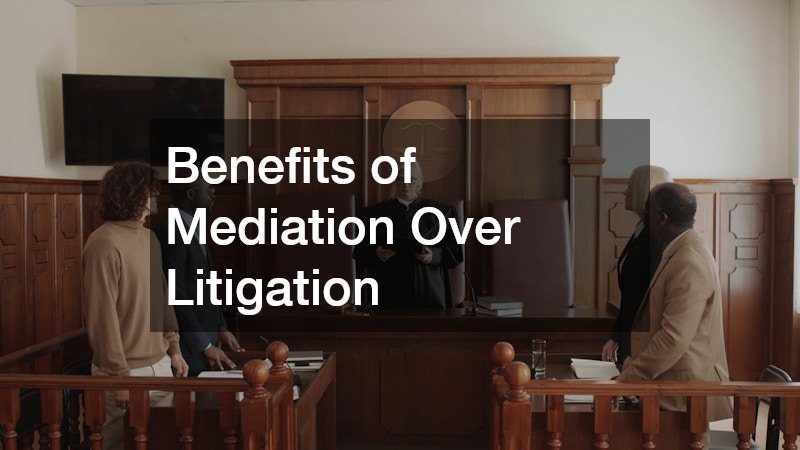In today’s fast-paced world, conflicts and misunderstandings are almost inevitable. Whether it’s a business disagreement or personal conflict, finding a peaceful and effective resolution is often challenging. This is where the role of a mediation attorney becomes pivotal. Mediation provides an alternative to the traditional courtroom battles, offering a more amicable path to resolve disputes.
In this article, we explore the vital role of mediation attorneys, the process they guide, and the numerous benefits of choosing mediation over litigation.
The Role of a Mediation Attorney
A mediation attorney acts as a neutral third-party facilitator in conflict resolution. Their primary goal is not to judge or make decisions but to assist the disputing parties in finding common ground. The role involves guiding discussions, encouraging communication, and helping parties understand each other’s perspectives. Mediation attorneys are skilled in conflict resolution techniques and possess the ability to de-escalate tensions. By maintaining impartiality, they ensure that the mediation process is fair and equitable for all parties involved.
One of the significant advantages of hiring a mediation attorney is their ability to provide structured yet adaptable mediation sessions. They tailor the approach based on the nature of the dispute and the needs of the participants. This flexibility often leads to more authentic and lasting solutions. Mediation attorneys also help manage expectations by clarifying the mediation process’s guidelines and principles. Their expertise ensures that the parties remain focused on resolution, rather than dwelling on past grievances.
The presence of a mediation attorney also signifies a commitment to peaceful conflict resolution. By choosing mediation, parties demonstrate a willingness to communicate and collaborate, which can lead to stronger relationships post-mediation. This approach not only resolves the immediate dispute but can also prevent future conflicts. Additionally, mediation attorneys can provide insights drawn from similar cases, offering creative solutions that might not be evident to those embroiled in the conflict. With a mediation attorney, the focus is on problem-solving and teamwork.
The Process of Mediation
Mediation begins with both parties agreeing to work together in the presence of a mediation attorney. Once the parties have agreed to mediation, the sessions are scheduled at a mutually convenient time and location. The mediation attorney provides an opening statement to outline the process, establish ground rules, and set the tone for cooperation. This initial phase helps establish trust and sets the stage for productive discussions. The structured environment ensures that all voices are heard, and disagreements are addressed constructively.
The core of the mediation process involves open dialogue facilitated by the mediation attorney. Parties are encouraged to voice their concerns, needs, and desired outcomes. The attorney guides the conversation, ensuring that discussions remain respectful and productive. During these sessions, the attorney helps identify common interests and encourages compromise where possible. The goal is to reach a mutually satisfactory resolution that respects the interests of all involved.
As the mediation progresses, the mediation attorney may use various techniques to help resolve impasses. This could include private caucuses,, reframing statements to enhance understanding, or suggesting alternative solutions. Each step is taken with the intent to build bridges and foster agreement. Once a resolution is reached, the mediation attorney drafts a mediation agreement, which can be legally binding if both parties consent. This document serves as a testament to the cooperation and problem-solving efforts of those involved.
Benefits of Mediation Over Litigation
Choosing mediation over litigation offers several compelling benefits. First and foremost, mediation is often a more cost-effective solution. Traditional litigation can be prohibitively expensive, whereas mediation typically incurs fewer costs due to its shorter timeframe and informal procedures. Additionally, mediation allows parties to maintain control over the resolution, rather than having a decision imposed by a judge or jury. This autonomy can lead to more satisfactory and personalized outcomes for the disputants.
The confidentiality of the mediation process is another significant advantage. Unlike court cases, which become part of the public record, mediation sessions are private and discreet. This privacy encourages openness and candidness, as parties are assured that their discussions will not be exposed publicly. Mediation also fosters a collaborative atmosphere, reducing animosity and fostering cooperation. This collaborative spirit often leads to better post-dispute relationships, whether in business or personal contexts.
A mediation attorney plays an essential role in facilitating peaceful and effective conflict resolution. By guiding parties through structured, yet flexible discussions, they enable compromises that litigation rarely achieves. The benefits of mediation, from cost and time savings to confidentiality and improved relationships, make it an appealing alternative to traditional legal proceedings. Whether you’re involved in a business disagreement or a personal conflict, the assistance of a skilled mediation attorney could be the key to finding a harmonious solution. As more people seek efficient and amicable ways to resolve disputes, the profession of mediation attorneys continues to grow in relevance and importance.




